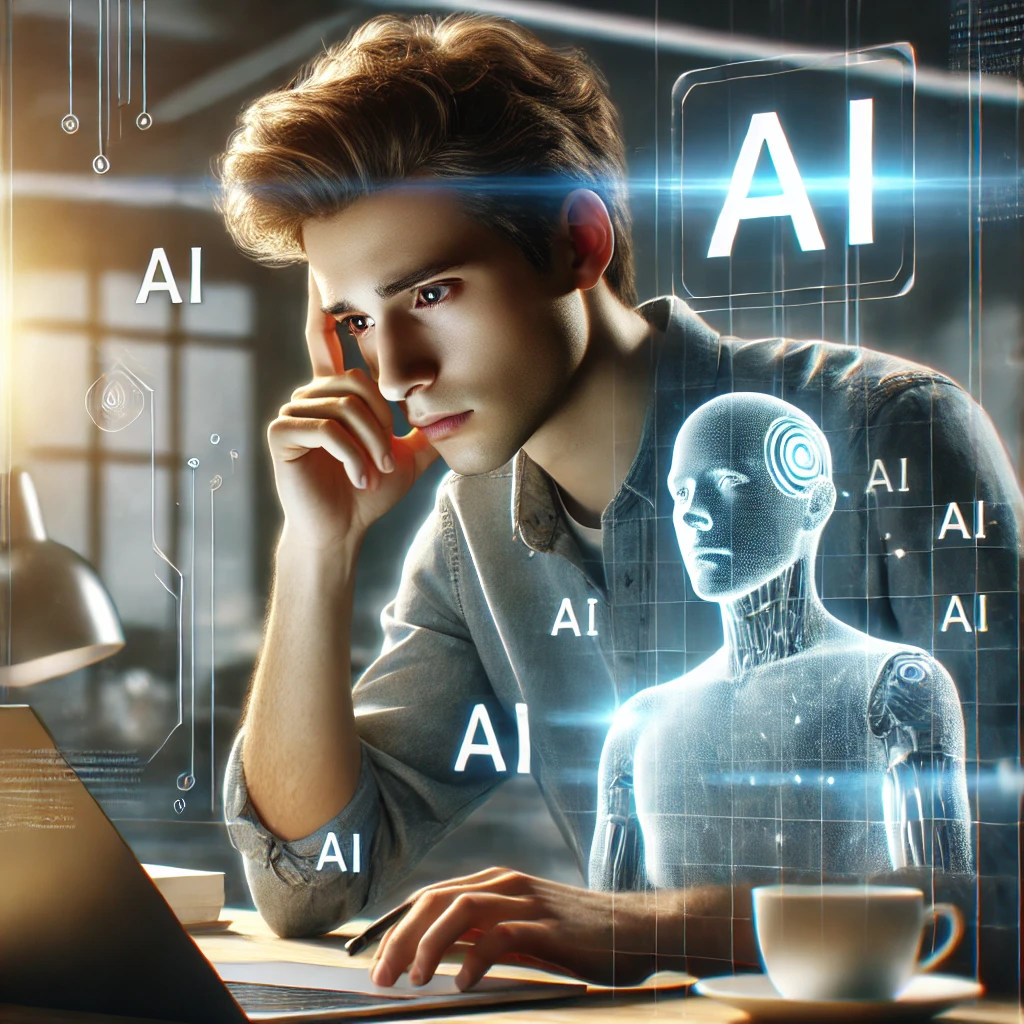AI Won’t Replace You—But Someone Using AI Will. Here’s How to Stay Ahead!
AI won’t replace you, but it’s shaking up the world of work in ways that demand attention.
Picture a bustling office where employees juggle spreadsheets, emails, and brainstorming sessions.
Now imagine a tool that drafts emails in seconds, predicts trends from data, and even suggests creative ideas.
That’s the promise of artificial intelligence, particularly generative AI, which has stormed into workplaces globally.
Yet, amid the excitement, a quiet fear lingers—will machines take over human jobs entirely?
The reality offers a twist: it’s not AI itself that’s the threat, but rather those who wield it effectively.
This article dives into how embracing AI can secure your spot in an evolving landscape.
By blending expert insights with practical steps, you’ll learn to harness this technology and stay ahead.
Table of Contents
The Changing Rules of Business
Machine learning has flipped the script on how companies operate.
Imagine a massive factory in the 1920s, humming with workers and clunky machinery.
Back then, the modern corporation was born, built on human labor and rigid processes.
Fast forward to today, and businesses like Google or Amazon run on a different fuel—algorithms.
These digital giants automate everything from search results to product recommendations.
The shift isn’t just about efficiency; it’s a complete rewiring of value creation and delivery.
Karim Lakhani, a Harvard Business School professor, highlights how AI redefines business architecture.
Scale, scope, and learning—once human-driven—are now supercharged by intelligent systems.
Why AI Won’t Replace You—Yet
AI won’t replace you because humans still hold the reins.
Think of a chef crafting a recipe while a smart oven adjusts the heat perfectly.
The oven enhances the chef’s skill, but it doesn’t dream up the dish.
Similarly, AI automates tasks but relies on people to design, test, and guide it.
Take Netflix: its recommendation engine is brilliant, but human creativity picks the shows.
This partnership between technology and talent is the new norm.
Lakhani emphasizes that machines handle transactions, while humans shape the vision.
So, relax—your job isn’t vanishing; it’s evolving.
The Inevitability of Digital Transformation
Digital transformation isn’t optional—it’s already here.
Picture yourself tapping an app for a ride, expecting a car in minutes.
If it’s late, frustration kicks in, a stark contrast to the days of week-long taxi bookings.
Consumers now live in an AI-first world, spoiled by instant solutions.
Yet, many companies lag, stuck in outdated workflows like six-month vendor onboarding.
The good news? Transition costs are dropping, and playbooks exist.
Lakhani notes the real hurdle isn’t tech—it’s organizational mindset.
Adopting a digital outlook is key to meeting modern expectations.
Building a Digital Mindset
A digital mindset isn’t about coding; it’s about understanding.
Imagine a manager who knows accounting basics—not to crunch numbers, but to grasp value.
AI knowledge works the same way—it’s now table stakes for business fluency.
You don’t need a PhD in machine learning to thrive.
Instead, it’s about continuous learning, a habit that keeps you relevant.
Companies must invest in this too, fostering curiosity across teams.
Lakhani stresses that executives and workers alike need this shift.
AI won’t replace you if you’re equipped to wield it wisely.
Preparing for the Unexpected
Technology waves like generative AI won’t stop coming.
Visualize a surfer eyeing the horizon, ready for the next swell.
Quantum computing looms, and surprises we can’t predict are inevitable.
How do you brace for that? It starts with a learning culture.
No one expects you to master every tool, but staying curious counts.
Lakhani suggests two imperatives: learning and change management.
Together, they build a flexible DNA that adapts to any tech tide.
Change as a Skill
Change isn’t a buzzword—it’s a craft.
Think of a company like Rakuten, where evolution is a core strength.
Most firms treat change as a one-off, met with eye rolls.
But what if it were a muscle you flexed daily?
Learning to change takes practice, adjustment, and intent.
Lakhani argues the best firms will master this skill.
It’s not about resisting the future; it’s about shaping it.
AI won’t replace you when you’re the one driving transformation.
Generational Gaps and Tech Adoption
Age shouldn’t dictate tech comfort, yet it often does.
Imagine a 102-year-old scoffing at email as “too modern.”
Now picture executives stumped by apps during a crisis like COVID.
Younger generations adapt faster, raised on smartphones and instant gratification.
But everyone can learn—it’s a choice, not a birthright.
Lakhani recalls helping family navigate travel tech, a wake-up call.
Companies mirror this: resist, and you’re left behind.
Embrace it, and you lead the pack.
Generative AI: The Next Frontier
Generative AI is rewriting what’s possible.
Envision a tool that crafts a vacation plan in seconds, tailored to your tastes.
That’s ChatGPT in action, a leap beyond simple automation.
It’s not just predicting words—it’s mimicking thought.
Lakhani likens it to the browser’s debut 30 years ago.
Back then, the internet slashed info costs; now, AI slashes cognitive costs.
This drop in “thinking expense” ripples across industries.
AI won’t replace you—it’s amplifying what you can do.
Where Are We in the Hype Cycle?
Generative AI feels transformative, but it’s early days.
Recall the browser’s infancy—cute at first, revolutionary later.
Today’s AI tools improve fast, with applications exploding.
Lakhani sees it as a “holy crap” moment, not a fade.
From content creation to decision-making, use cases abound.
Yet, hallucinations—confident errors—remind us it’s imperfect.
Businesses must experiment now, not wait.
AI won’t replace you if you’re testing its limits.
Practical Steps for Businesses
How does a company tap into this? Start small.
Imagine a sandbox where teams play with AI tools.
Boot camps demystify it for all, not just techies.
Lakhani urges leaders to ditch bans—people use it anyway.
Test where it shines and where it flops.
For publishers, it’s a co-writer, not a ghostwriter.
Responsibility stays human, verifying AI’s output.
AI won’t replace you when you’re the one steering it.
Ethical Challenges and Bias
AI isn’t flawless—it mirrors our flaws.
Picture a healthcare system already skewed against some groups.
AI can amplify that bias, baked into its data.
Lakhani, tied to Mozilla.ai, pushes for open-source fixes.
Leaders must ask: Is our data fair? Is our training sound?
Learning these ropes isn’t optional—it’s ethical duty.
Bias predates AI, but now we can spot and tweak it.
AI won’t replace you if you’re correcting its course.
Customers and Adaptation
Customers often outpace companies in tech savvy.
Imagine a buyer who knows your gaps better than you.
They adapt fast, living in a digital-first reality.
Lakhani notes sales teams miss these cues, stuck in old loops.
Focus groups won’t cut it—observe real behavior.
Your audience expects AI-level ease, like Amazon’s flow.
Help them by meeting them where they are.
AI won’t replace you when you sync with their pace.
Sentience or Illusion?
Does AI feel alive? It’s a trick question.
Picture chatting with a bot that seems to care.
It’s just stats, trained on human words, says Lakhani.
Yet, experts whisper: strong AI might be 20 years off.
What if it arrives and we miss it, assuming human traits?
Science fiction hints at alien forms of intellect.
For now, thank your robots—just in case.
AI won’t replace you; it’s still your tool.
Conclusion
AI won’t replace you, but it’s reshaping work’s horizon.
Imagine a future where thinking tools lift everyone’s game.
The edge goes to those who embrace, learn, and adapt.
Lakhani’s insights show it’s not tech alone—it’s us plus tech.
Start experimenting, build that mindset, and master change.
Someone using AI will outpace the hesitant.
Stay ahead by making AI your ally, not your rival.
The journey’s just begun—where will you take it?

We strongly recommend that you check out our guide on how to take advantage of AI in today’s passive income economy.




